Illinois Summer Research Symposium Showcases Undergraduates’ REU Experiences
August 14, 2018
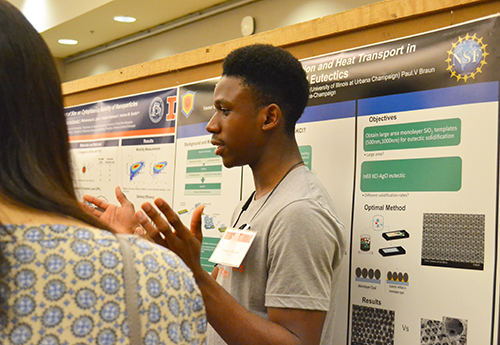 POETS REU participant Favour Obuseh discusses his research on Heat Transport with visitors.
POETS REU participant Favour Obuseh discusses his research on Heat Transport with visitors. On July 19–20, 2018, over 150 undergraduate students and pre-doctoral students presented posters at the 2018 Illinois Summer Research Symposium (ISRS) as a culmination of their summer research experiences at Illinois. The students not only conducted studies in the labs of some of Illinois’ world-renowned researchers, but many of them were part of undergraduate programs that also partnered with SROP, the Graduate College’s Summer Research Opportunities Program. This allowed the undergrads to participate in professional development activities, many of them in preparation for possibly continuing their education and research in graduate school, and also provided the students networking opportunities.
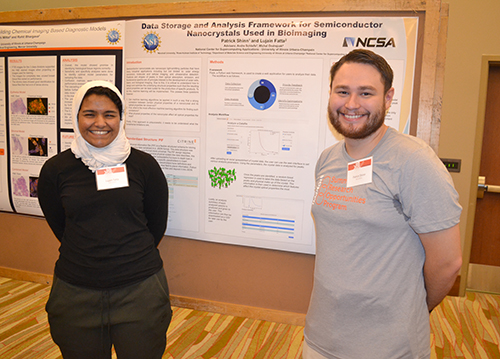 Lujain Fatta and Patrick Shinn who participated in NCSA's INCLUSION REU by their poster at the ISRS.
Lujain Fatta and Patrick Shinn who participated in NCSA's INCLUSION REU by their poster at the ISRS. The 14 programs with students participating in the Symposium included REUs (Research Experience for Undergraduates), such as the Frontiers in Biomedical Imaging REU; Memerres (Mentor-Mentee Relationships in Research); INCLUSION (Incubating a New Community of Leaders Using Software, Inclusion, Innovation, Interdisciplinary & OpeN Science); POETS (Power Optimization of Electro-Thermal Systems); and SURE Tox (Summer Undergraduate Research Experience in Toxicology), to name a few. Also participating was a program which provided research opportunities for rising doctoral students, the Grad College’s SPI (Summer Predoctoral Institute).
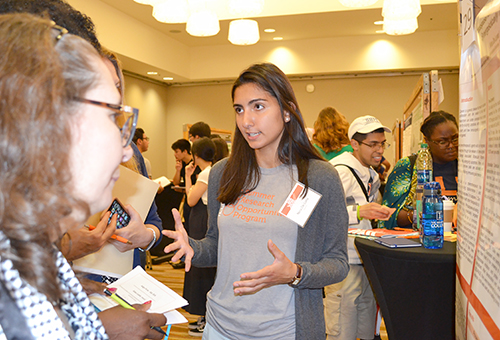 REACH participant, Nina de Luna shares at her research with visitors to the 2018 ISRS.
REACH participant, Nina de Luna shares at her research with visitors to the 2018 ISRS.Among the many REU programs and opportunities across campus were two new programs. One was REACH (Research and Education for the Advancement of Compassionate Healthcare). Sponsored by the Carle Illinois College of Medicine, REACH has an additional clinical component (thus making it an RCEU) and aims to provide an interdisciplinary experience for undergraduates interested in healthcare.
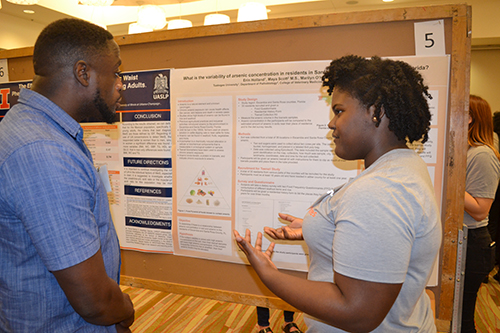 WE CAN REU undergrad Erin Holland discusses her research with a visitor to the ISRS.
WE CAN REU undergrad Erin Holland discusses her research with a visitor to the ISRS. In its second summer, Wildlife Engineers Co-managing Agriculture and Nature (WE CAN), funded by the United States Department of Agriculture (USDA), is a two-summer program focused on combining aspects of agriculture, engineering, and wildlife into their research experiences. Below are synopses discussing the research and impact on several students who participated in these programs then presented at the Symposium.
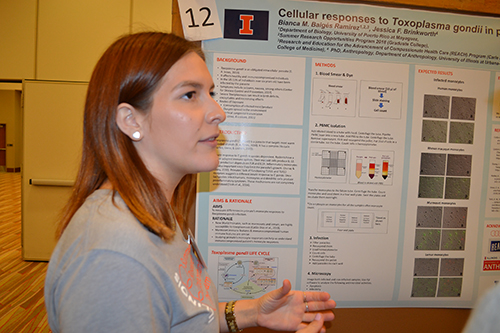 Bianca Baiges explains her study on Toxoplasma gondii to a visitor to ISRS.
Bianca Baiges explains her study on Toxoplasma gondii to a visitor to ISRS. Bianca Baiges
Participating in the REACH program was Bianca Baiges, a rising junior at the University of Puerto Rico, Mayaguez, who, despite applying to multiple programs, was drawn to the program because she specifically liked the REACH emphasis and diversity initiative.
She further explains: “I also like that they have a focus on trying to implement healthcare and reaching different communities. I really like to help people, and I'm really interested in medicine, so I really like that approach.”
Since Baiges studies Biology and Animal Sciences, she found a fit in Dr. Jessica Brinkworth’s Evolutionary Immunology and Genomics laboratory because it focuses on Anthropology, particularly Biological Anthropology.
She explained their work: “We basically analyzed how a parasite affects different primates, and I think that's very interesting because I love to understand the connection between humans as well as different animals.”
Though she admits that analyzing the data has been a challenge for her, Baiges does not currently have any results but expects to come up with promising results upon further analysis of her data in the coming weeks. Baiges plans to pursue medical school upon the completion of her current studies, and says she is interested in the Carle Illinois College of Medicine.
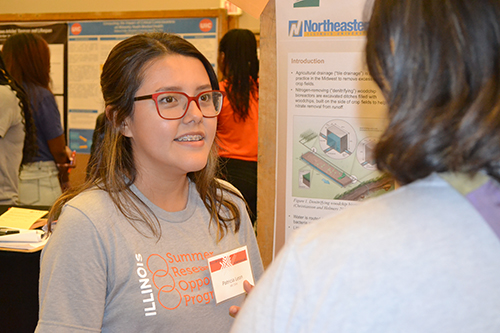 WE CAN REU participant, Patricia Leon, presents her research poster at the 2018 ISRS.
WE CAN REU participant, Patricia Leon, presents her research poster at the 2018 ISRS. Patricia Leon
Patricia Leon, a 4th year Environmental Sciences student at Northeastern Illinois University, was interested in WE CAN because of its connection to agriculture and wanted to gain research experience pertaining to agriculture-related sciences.
Leon worked with Dr. Laura Christianson and the Illinois Drainage Research and Outreach Program (I-DROP) analyzing woodchip bioreactor leachate through the denitrification of drainage water. She described her research as: “the analysis of a specific type of agriculture drainage practice called nitrogen removing or de-nitrifying woodchip bioreactors.”
Leon has determined that the bioreactors in the area have some levels of wood leachate present, which occurs when woodchips seep into the water. She further explains her results: “I determined that in some of the bioreactors, when water is stuck inside the woodchips and kind of brewing within the woodchips, which allows more woodchip material to leach into the water.”
Although Leon’s research focused on the byproducts of agricultural wastewater, she said her research suggests that leaching could be possible in both well water and in soil, adding that it depends on how many woodchips are present and whether or not the woodchips are fresh. She adds: “Farmers have to route the water directly through the woodchips in the first place to remove nitrates from the water.”
Reflecting on her experience with WE CAN, Leon says that she liked the research she was doing and would love to come to Illinois. She explains: “I'm planning on applying for graduate school, and because of the WE CAN program, I actually got to be in the department that I want to be applying into and got to do research with a professor.”
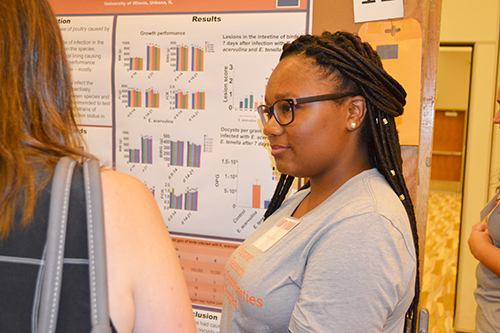 Naomi Waldon discusses her research with a visitor to the 2018 ISRS.
Naomi Waldon discusses her research with a visitor to the 2018 ISRS. Naomi Waldon
Naomi Waldon, a rising junior studying Animal Science at Tuskegee University, participated in the WE CAN REU after receiving encouragement from the head of her department. She elaborates on this saying: [The department head] knew I was looking for an internship, and I was looking into SROP, for example, and they had just started [WE CAN] last year, and she was trying to find recruits, so she knew I was looking for a research opportunity. She was like ‘Hey, this is a good idea for you!’ and so I applied and was one of the two girls selected [from Tuskegee University] to come.
Waldon’s research in Dr. Ryan Dilger’s Nutrition, Health, and Neuroscience laboratory focuses on finding out what the effective dose of coccidia, a parasite, is in chickens to cause a 15–20% depression in body weight gain. The results will determine what dosages will be used in a future study and she suspects that they will need to use higher doses of the parasite to induce 15–20% depression in body weight gain desired.
Though she was off to a rough start after switching labs, Waldon says research was a bit of a wakeup call for her because she was not aware of how difficult research could be or of everything that goes into it. She recalls her experience: “I was actually supposed to be doing a different project at the beginning of the year, but that project got terminated because something happened to the control group, and you can't do a project without a control group. And so I ended up having to start over. I had to research a whole new topic, had to move to a different lab and stuff like that.”
So she learned how to work under pressure and deal with procrastination, which, she admits, proved to be quite the challenge for her because she found herself playing catch up for a while. Despite the initial setbacks, Waldon remains optimistic regarding her future in research and has her sights set on attending graduate school.
Reflecting back on her WE CAN experience, Waldon says “Overall, this summer was really, really fun, and I loved the experience that I had between this summer and last summer with the WE CAN group, so I'm really happy that I got this experience.”
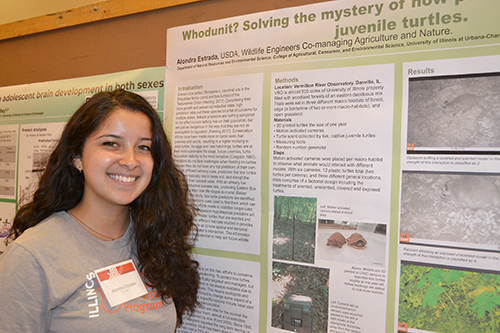 Alondra Estrada presents her poster about her research on turtles.
Alondra Estrada presents her poster about her research on turtles. Alondra Estrada
Alondra Estrada, a rising junior studying Natural Resources and Environmental Science here at Illinois, got involved with the WE CAN REU program because Dr. Thompson, Assistant Dean of the College of ACES, sent her an email encouraging her to apply. She was particularly excited about this opportunity because it combines many of the fields she’s interested in, adding: “I'm very interested in finding the connection between biology and the natural sciences with other fields, including engineering and animal sciences and all that.”
Estrada’s research in Dr. Jinelle Sperry’s lab was focused on turtle conservation, particularly of juvenile turtles, and determining what sort of sensory cues predators use to find the turtles. She spent her summer going out into the woods to collect data for her project each week.
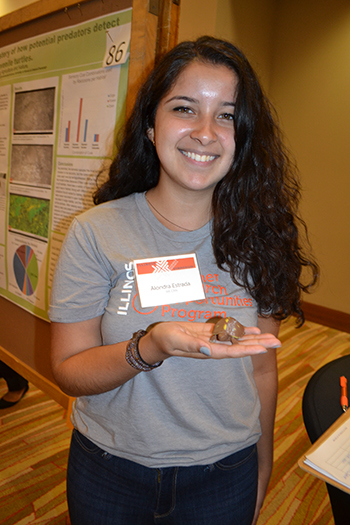 Alondra Estrada shows one of the 3D-printed turtles used in her research.
Alondra Estrada shows one of the 3D-printed turtles used in her research. Estrada explains: “My project is unique in the way that it used 3D-printed turtles, which we printed here on campus, so we were able to monitor the model turtle, the plastic turtle, without having to be there. The models were set out for different weeks at a time, and so I didn't have to be there the whole time, but I was out there for a majority of the day throughout the week, different weeks, placing them, scenting them or not scenting them, and then watching the footage after each trial.”
She found that, combined with evidence found in previous studies, chemical, visual, and tactile stimuli are important cues that predators use to seek out turtles. In the woodlands where Estrada conducted the trials, predators included raccoons, possums, rabbits, chipmunks, and squirrels.
Despite the frustration from technical malfunctions and the poison ivy Estrada suffered while working out in the field, she says the experience was really fun. In fact, she’s returning to the Sperry Lab this fall, and looks forward to carrying out the rest of the project and assisting with other projects.
Regarding her new BFF, the turtle, Estrada admits she wasn’t looking to work with them specifically, but she gushes: “I definitely have become obsessed with [turtles]. I have come to love them very much.”
Story by Brittany Rhed, I-STEM Undergraduate Student Worker, with Elizabeth Innes, Communications Specialist, I-STEM Education Initiative. Photos by Elizabeth Innes.
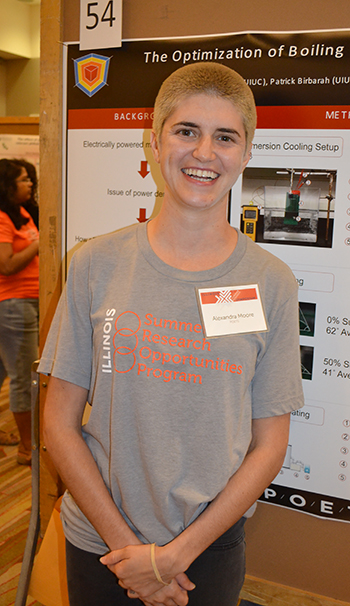 POETS REU participant Alexandra Moore presents her poster at the ISRS.
POETS REU participant Alexandra Moore presents her poster at the ISRS. For more articles about REACH RCEU and WECAN REU, please see:
- Illinois Summer Research Symposium Showcases Undergraduates’ REU Experiences
- Undergrad Brione Griffin Gets One Step Closer to Her Dream of Becoming a Doctor Via REACH RCEU
- REACH Program’s Emphasis of Research Plus Clinical Confirms Alexis Chamorro-Ortiz’s Career Goals: To Both Treat and Research Cancer
- Undergrad Brione Griffin Gets One Step Closer to Her Dream of Becoming a Doctor Via REACH RCEU
- Underrepresented Minority Undergraduate Students Gain Research, Clinical Experience Via the Carle Illinois College of Medicine’s New REACH RCEU
- WE CAN REU Provides Minority Students an International Experience, Research at the Intersection of Engineering and Agriculture
More: REU, Summer Research, Undergrad, 2018













.jpg)
















